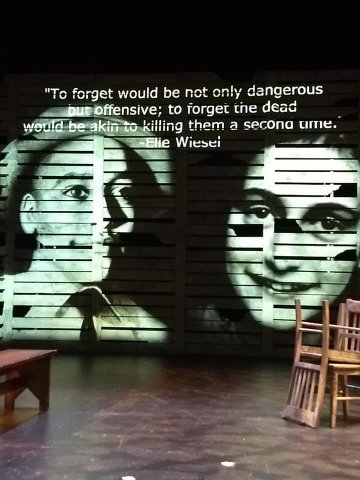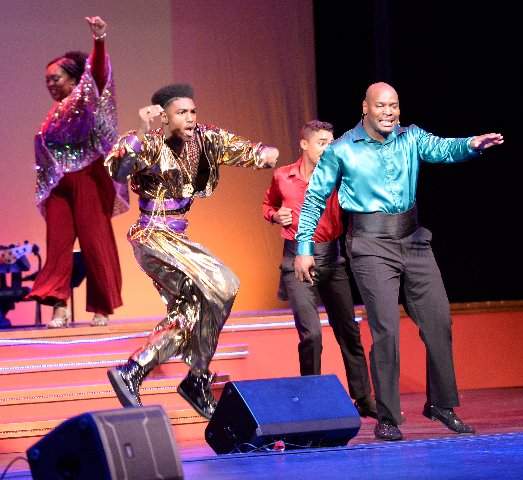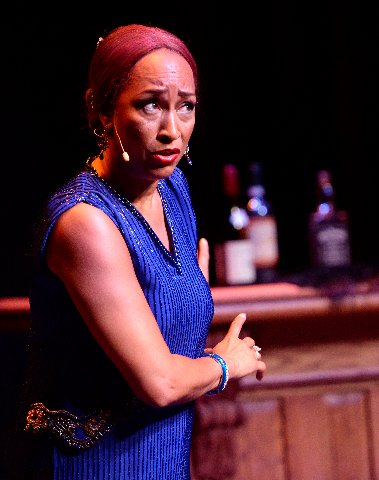National Black Theatre Festival, 2019
Winston-Salem, North Carolina,7/29-8/3
By: Astrid Hiemer - Aug 12, 2019
National Black Theatre Festival Now 30 Years Old
The North Carolina Black Repertory Company was founded forty years ago, in 1979, in Winston-Salem. It has produced the National Black Theatre Festival bi-annually for the past thirty years. At most events there was a ten second pause at the beginning to honor its late and larger than life founder, Larry Leon Hamlin. Dr. Maya Angelou, who lived in Winston-Salem, was on board right away and became the first Festival Chairperson, inviting known black performers and singers to take part in the festival which is still booming.
The black audience came then and now from many States and coast-to-coast. It is truly a loyal public. Many who return to every festival, make their hotel reservations one or two years in advance and purchase tickets ‘blindly’ - so we learned. Southern graciousness and easy conversations were shared everywhere. We were truly welcomed as minorities during the festival, which does have a small percentage of non-black theatergoers from Winston-Salem and nearby towns and cities.
Since 2019 is ‘the year of song,’ the festival committee chose a larger number of musicals than usually to be performed this time. Among them, we much enjoyed the high energy performances of the Westcoast Black Theatre Troupe of Sarasota, Florida. Soul Man, A Musical Revue was created and adapted by Nate Jacobs, its founding director. Five soul-men, one woman and a hip-hop and rap singer and dancer lead the audience through twenty or more years of ‘soul searching.’
Women of Soul, by the Black Ensemble Theater from Chicago, Illinois, was produced by Jackie Taylor, who started the very successful company in 1976. The show was written and directed by Daryl Brooks, who staged solo memories of the Young Josephine Baker, Mahalia Jackson, Etta James, Donna Summers, Janis Joplin and others. Finally, all nine singers and actors performed a golden (gown) tribute to Aretha Franklin. What a smashing success!
The Greenbrier Valley Theatre of Lewisburg, West Virginia, was invited to introduce Bricktop: Legend of the Jazz Age, a one woman show. Gabrielle Lee, here Ada ‘Bricktop’ Smith, performed beautifully more than 20 songs as part of Bricktop’s storied life as an expatriate in Paris, Mexico City, and Rome. There she was, as she put it, a saloon-keeper: Chez Bricktop, and invited the biggest American performers, musicians, singers and acts from the 1920’s to 1960’s.
We saw one other musical – The Movement: An A Cappella Musical by LEAP, Artists LIVE! and in collaboration with Diversity Youth Theatre in New York City. The driving force of this work is Kathy D. Harrison as: Director, producer of the book, original music and lyrics as well as the complex step- and dance arrangements. She also leads the eleven mostly young cast members.
The Movement is an educational experience based on The Children’s Crusade of 1963 in Birmingham, Alabama. High School and College students were trained for weeks in non-violent resistance before they were ready to protest the lack of integration in Birmingham schools. During the protest, the students were hosed with water, had attack dogs set upon them and finally were arrested. These young protesters played their part in moving the Civil Rights agenda forward.
The Movement: An A Cappella Musical was named the 2019 Best Musical at the New York Theater Festival and indeed, is a serious and deeply rewarding experience.
The North Carolina A&T State University presented Ruined, a powerful and demanding play by Lynn Nottage. It chronicles abuse and sexual abuse of women in war times, here during the 2000’s in the Democratic Republic of Congo (DRC).
The United Nations, Security Council, passed UN Resolution 1820 in 2008. It declares sexual abuse and rape the most insidious War Crimes that can since be prosecuted.
The Japanese Army forced young women, from occupied countries, Korea, China and Indonesia into sex slavery as so called ‘Comfort Women.’ These crimes lasted from 1931 to 1945, where an estimated 200,000-400,000 women became forced prostitutes. Japan has still not fully acknowledged those crimes.
During WWII in Europe civilian women were raped by certain groups of soldiers. I remember growing up in post war Germany with the knowledge, that particularly young women were hidden or tried to look ugly by smearing their faces and bodies with dirt and wearing dirty clothes in order to avoid attacks from passing soldiers and armies.
Yes , Ruined, is a play worth seeing, no matter who will produce it in the future.
Anne & Emmett, by Janet Langhart Cohen, pairs on stage Anne Frank, a Jewish, German-Dutch girl, and Emmett Till, a young black boy from Chicago. Ann died in 1945 in Bergen-Belsen, a concentration camp in Germany, after the family had been reported hiding in Amsterdam for two years. Ann was 15 when she died and Emmett was just 14. The world has read Ann’s diary in many languages, millions of times over. Emmett was lynched by two brothers after allegedly offending a white woman in Money, Mississippi, in 1955.
They share their life-stories in earnest and occasionally in lighthearted dialogues and banter, until we see the murder scene of Emmett - just heartbreaking minutes! Juxtaposing these two young lives in well-crafted and strong language, even though they lived thousands of miles and a decade apart rings true!
We are also introduced to Anne’s beloved father and Emmett’s strong and determined mother, who decided to have his mangled face and body presented in an open casket funeral in Chicago. Thousands of people passed the casket and it became another building block in the Civil Rights Struggle.
The play: Anne & Emmett has been and will continue to tour schools and college audiences nationwide. A room is dedicated to Emmett Till’s life and death at the National Museum of African American History and Culture, in Washington, D.C.
These were sobering performances among many celebrations. The African American theatre and their public are alive and well!
Other articles about the 2019 Black Theatre Festival on Berkshire Fine Arts have been written by:
And NancyBishop:




